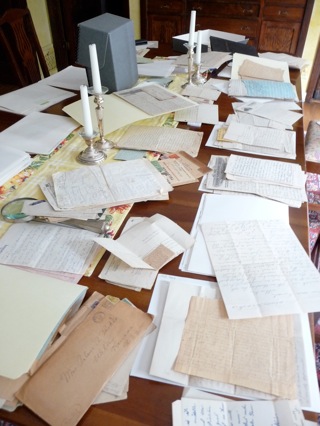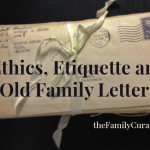
Can a genealogist ever have too much stuff? And, what do you do with all that inherited treasure? Allison Stacy, Editor at Family Tree Magazine, posed the question of how to Organize Grandma’s Archive in the current issue of Family Tree Magazine and recently on the Genealogy Insider blog. Readers have responded with a host of ideas summarized by Managing Editor Diane Haddad.
“I’m not one to make a mountain out of a molehill,” writes Allison, “But this actually resembles a mountain.”
Allison has over two dozen bankers’ boxes, several organized and labeled by her grandmother, and some packed full with notebooks, loose papers, and files. Any way you look at it, she has quite a task ahead of her. I know how she feels. When I first brought home my grandmother’s accumulated treasures, I had no idea the sense of responsibility and confusion that would result.
- How to preserve the most precious?
- How to sift through the massive quantity?
- How to decide what to keep and what to give away or throw away?
- How to organize it all?
I don’t have all the answers, but in the past 12 years I’ve tried a lot of organizing schemes and settled on what works best for my situation. The Family Curator blog was born out of working with my grandmother’s archive, and blogging has brought new insights to the problem.
My first advice to Allison might seem overly simple, but I learned when it comes to family treasures — think first, then act. Before you can begin to tackle your family history mountain, you need to know your goal.
Do you want to simply climb to the summit, collating and labeling as you go? or Do you want take a leisurely hike, with time to admire the scenery along the way? Will you be taking along a movie crew to document your progress with plans for a book in the future? or Maybe you would prefer to conquer the summit, keep the memory, and move on to new adventures.
Dealing with a family history archive is a lot like climbing a mountain. The mountain isn’t going away, but the journey will be much more enjoyable with careful planning and preparation.
I’ve compiled a short list of things to look for when sorting through a family archive, but sometimes it helps to get specific. Do you have a suggestion to add to the list?
The Family Curator’s Short List
What to Watch for in a Family Archive
- Vital records (birth, marriage, death)
- Employment records (pay stubs, job contracts, resume)
- Educational records (school photos, report cards, citizenship certificates)
- Church records (church bulletin, receipt for donation, photos)
- Names and addresses (club, church and school rosters, personal address book, community directory)
- Military records (service record, correspondence, photos)
- Family history (narratives, charts, genealogy)






Great post! I would add family scrapbooks. These tell so much about the person who created them.
Great post! Almost all of the records I have are on my computer (I've scanned even the few paper records to my computer as well), but I've been thinking of printing them out and keeping binders. But I can see that becoming very messy very quickly, heh.
It's probably a good idea to back everything up to a disc or hard drive in case the puter crashes…
I would add "personal letters" to your list of items to watch for. Newsy communications between family members can shed a lot of light on relationships, events and so on, quite aside from being interesting to read and valuable for the sense of daily life lived in other times.
Thank you for this post. Excellent information, I had to post to fb.
Good reminder, Heather. Even a foreign language dictionary would be a help.
Thanks for the post. I am currently going through 20 years of collected "stuff" that I am trying to go through with "new eyes" and see things that I might have missed before. This helps!
What a great post. I just had to do this in Spain. If you have to do this in a foreign country, or with the family papers of a recent immigrant, make sure you have someone there who is fluent or a native speaker of the language. Some papers we thought were not important turned out to be a complete military record, from cadet school through retirement!